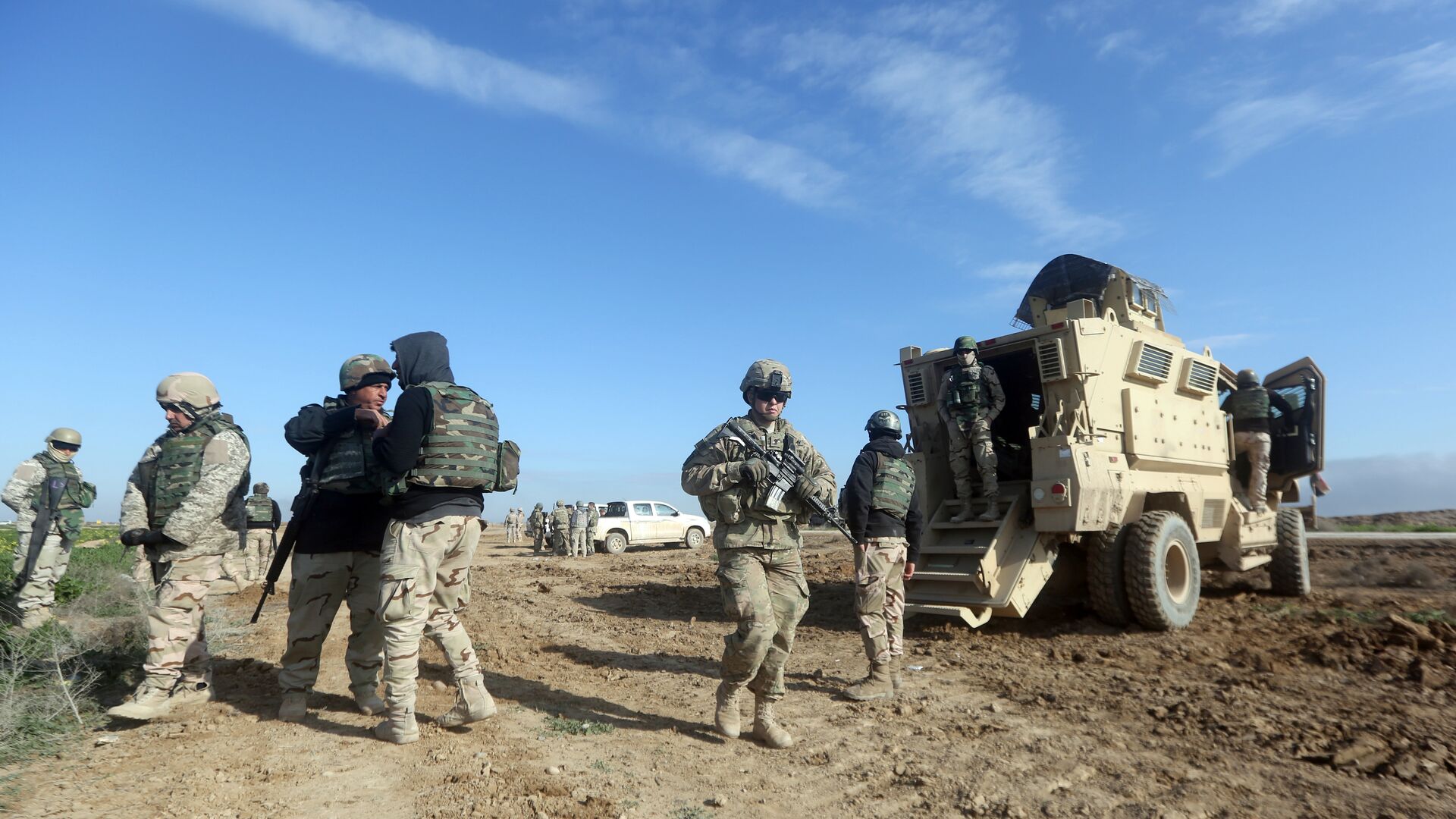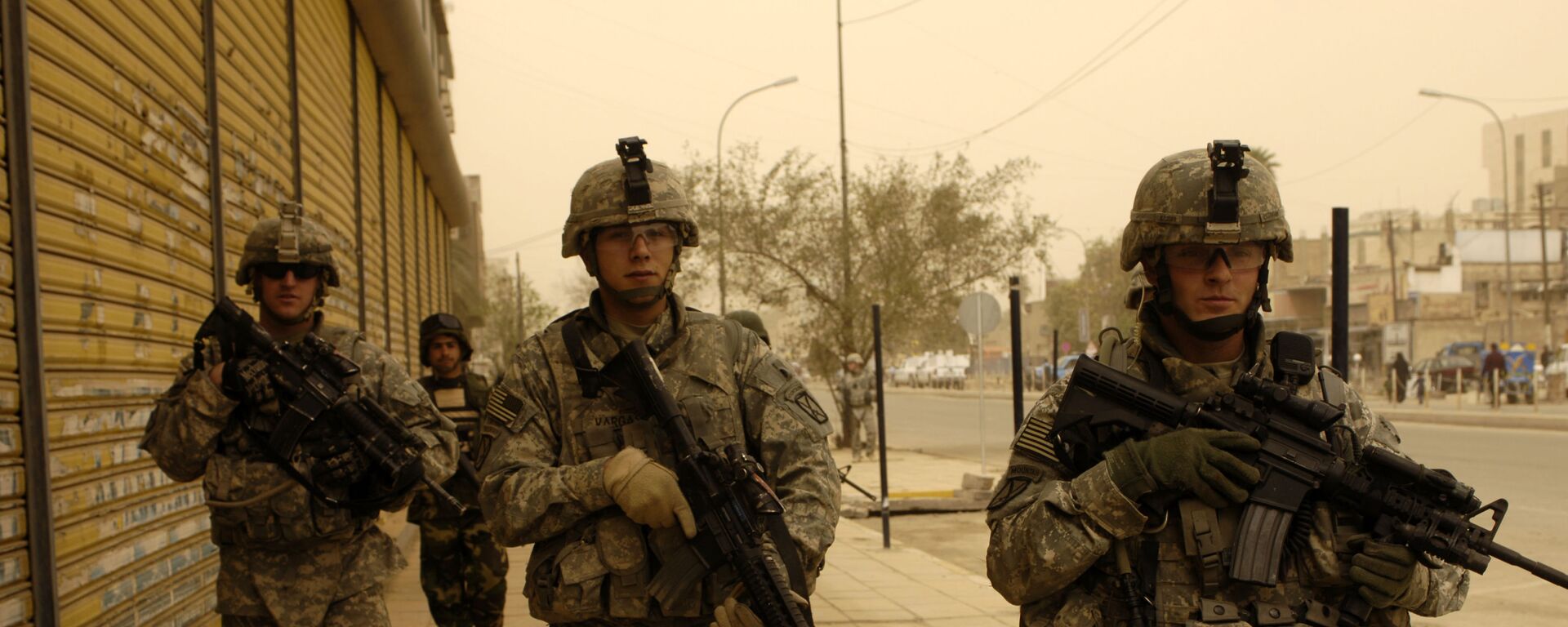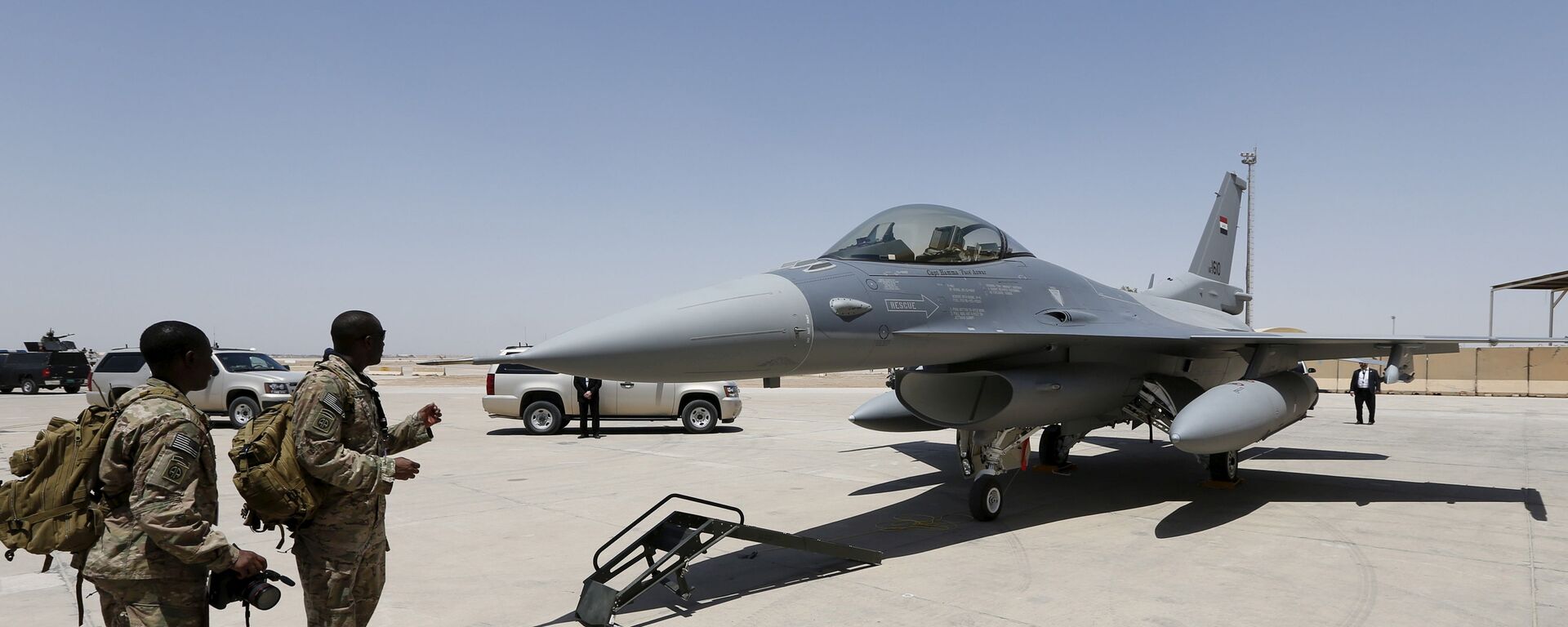https://sputnikglobe.com/20210802/us-pulling-out-troops-from-iraq-symbolically-leaving-a-void-in-war-torn-country-ex-un-envoy-says-1083505907.html
US Pulling Out Troops From Iraq 'Symbolically', Leaving a Void in War-Torn Country, Ex-UN Envoy Says
US Pulling Out Troops From Iraq 'Symbolically', Leaving a Void in War-Torn Country, Ex-UN Envoy Says
Sputnik International
A former Iraqi diplomat warns that the US withdrawal might present an opportunity for some elements to fill the void. One of these players could be Daesh*... 02.08.2021, Sputnik International
2021-08-02T08:51+0000
2021-08-02T08:51+0000
2023-01-08T16:44+0000
opinion
iran
troops
uk troops
troops withdrawal
us
iraq
https://cdn1.img.sputnikglobe.com/img/103399/75/1033997594_0:241:5315:3231_1920x0_80_0_0_81c5e68133d0adce2043e9cbe83af748.jpg
After almost two decades of heavy military presence, the US mission in Iraq seems to be nearing an end.Last week, the US announced that it would pull out all of its combat troops, 2,500 people, from Iraq by the end of the year.Symbolic PulloutBut Feisal Amin al-Istrabadi, a former Iraqi diplomat who served as the nation's ambassador to the United Nations, says the pullout will be largely "symbolic" and it won't have any significant impact on the ground.That mistake is still fresh in the minds of many Iraqis. In 2010, al-Maliki vowed that his country would be free of the American presence by the end of 2011. But the moment their troops started leaving, terrorism began rearing its head.As Daesh terrorists started seizing control of large swathes of Iraqi territory, al-Maliki came running back to the US, asking for military assistance.Al-Kadhimi doesn't want to put himself in a similar position, says al-Istrabadi, especially as the parliamentary elections in Iraq are just around the corner and the PM is hoping to be re-elected.Remaining in power won't be easy for al-Kadhimi. He does enjoy the support of the public but to stay in his seat, he will also need to find a middle ground between appeasing the pro-Iranian and pro-American factions within his parliament. For now, these two elements are pulling the rope in opposite directions. The American elements within the parliament want to see the US taking a more active role in Iraq, while the pro-Iranians factions would like to end Washington's presence in the area."Al-Kadhimi is trying to walk a fine line between appeasing the pro-Iranian factions and standing up for Iraqi sovereignty and [placating] the pro-American elements, as Iraq will still need their military assistance and training."Reasons for the Pullout.It is still not that clear how much of that military support Washington will be willing to give. Recent polls suggest that US public opinion is divided over the country's involvement in Iraq. In 2019, a Gallup survey found that 50 percent of respondents thought it had been a mistake to send troops to the war-torn country; 51 percent thought the United States has become a less safer place to live since the invasion.However, appeasing the public is not President Biden's only goal, and al-Istrabadi suggests his administration has a number of other priorities."The Middle East is not that important for them anymore. They have other problems to worry about [including] Russia and China. Remaining in Iraq doesn't fit in." In addition, the Biden administration is also holding a series of talks with Iran over its nuclear ambitions. Washington would like to have an ability to supervise Tehran's atomic programme in exchange for the lifting of the sanctions, and the general belief in Iraq is that the removal of US troops from the war-torn country would help the Americans seal a deal with the Iranian leadership. Filling the Void However, it might also send a signal that America's positions in the area are only getting weaker. The fear is that that situation might be exploited by some elements which would try to fill the void.One such element could be Daesh, with reports in 2020 suggesting that the terrorist group has been making gains in Iraq. Another element that could potentially get stronger is Iran, and al-Istrabadi says it has definitely got the hunger to play a more active role in the Shiite-majority country.Iran, claims the former diplomat, adheres to a "divide and conquer policy" in Iraq. According to al-Istrabadi, it wants Baghdad to be "weak, unstable and chaotic", because this way, "they can control it more easily".Iran has continuously insisted that its activity in Iraq is aimed at curbing the threat of terror.According to al-Istrabadi, pro-Iranian militias are already in control of large parts of Baghdad, Iraq's capital. And if this is the case, 18 years after the war in Iraq kicked off, the future is still looking bleak for the country."We have had many years of bad management. During those years, we didn't empower our political class, while our electorate kept on voting for the same people, who weren't up for the job. Now we are paying the price."*Daesh, also known as ISIS/IS/Islamic State, is a terrorist group banned in Russia and many other countries.
https://sputnikglobe.com/20210726/biden-us-troops-iraq-2021-partnership-shift-1083465929.html
https://sputnikglobe.com/20210727/all-us-troops-including-criminal-air-force-must-quit-iraq-militia-warns-as-occupation-rebranded-1083472029.html
iran
iraq
Sputnik International
feedback@sputniknews.com
+74956456601
MIA „Rossiya Segodnya“
2021
News
en_EN
Sputnik International
feedback@sputniknews.com
+74956456601
MIA „Rossiya Segodnya“
Sputnik International
feedback@sputniknews.com
+74956456601
MIA „Rossiya Segodnya“
opinion, iran, troops, uk troops, troops withdrawal, us, iraq
opinion, iran, troops, uk troops, troops withdrawal, us, iraq
US Pulling Out Troops From Iraq 'Symbolically', Leaving a Void in War-Torn Country, Ex-UN Envoy Says
08:51 GMT 02.08.2021 (Updated: 16:44 GMT 08.01.2023) A former Iraqi diplomat warns that the US withdrawal might present an opportunity for some elements to fill the void. One of these players could be Daesh* terrorists, while the other could be Iran, whose militias ostensibly controls large chunks of the capital, Baghdad.
After almost two decades of heavy military presence, the US mission in Iraq seems to be nearing an end.
Last week, the US announced that it would pull out all of its combat troops, 2,500 people, from Iraq by the end of the year.
But Feisal Amin al-Istrabadi, a former Iraqi diplomat who served as the nation's ambassador to the United Nations, says the pullout will be largely "symbolic" and it won't have any significant impact on the ground.
"Even when they are gone, I believe there will be some discrete areas where the US troops will be housed. Although [Prime Minister Mustafa] Al-Kadhimi does want to end the American mission, he doesn't want to repeat the mistakes of [former PM] Nouri al-Maliki."
That mistake is still fresh in the minds of many Iraqis. In 2010, al-Maliki vowed that his country would be
free of the American presence by the end of 2011. But the moment their troops started leaving, terrorism began rearing its head.
As Daesh terrorists started seizing control of large swathes of Iraqi territory, al-Maliki came running back to the US, asking for
military assistance.
Al-Kadhimi doesn't want to put himself in a similar position, says al-Istrabadi, especially as the parliamentary elections in Iraq are just around the corner and the PM is hoping to be re-elected.
Remaining in power won't be easy for al-Kadhimi. He does enjoy the support of the public but to stay in his seat, he will also need
to find a middle ground between appeasing the pro-Iranian and pro-American factions within his parliament. For now, these two elements are pulling the rope in opposite directions.
The American elements within the parliament want to see the US taking a more active role in Iraq, while the pro-Iranians factions would like to end Washington's presence in the area.
"Al-Kadhimi is trying to walk a fine line between appeasing the pro-Iranian factions and standing up for Iraqi sovereignty and [placating] the pro-American elements, as Iraq will still need their military assistance and training."
It is still not that clear how much of that military support Washington will be willing to give. Recent polls suggest that US public opinion is divided over the country's involvement in Iraq. In 2019,
a Gallup survey found that 50 percent of respondents thought it had been a mistake to send troops to the war-torn country; 51 percent thought the United States has become a less safer place to live since the invasion.
"Iraq is not a burning issue in the US anymore. People are beyond it. For them, it is no longer 2003 and the American presence is perceived as troops that are protecting the elite. Biden wants to end it all."
However, appeasing the public is not President Biden's only goal, and al-Istrabadi suggests his administration has a number of other priorities.
"The Middle East is not that important for them anymore. They have other problems to worry about [including] Russia and China. Remaining in Iraq doesn't fit in."
In addition, the Biden administration is also holding a series of talks with Iran over its nuclear ambitions. Washington would like to have an ability to supervise Tehran's atomic programme in exchange for the lifting of the sanctions, and the general belief in Iraq is that the removal of US troops from the war-torn country would help the Americans seal a deal with the Iranian leadership.
However, it might also send a signal that America's positions in the area are only getting weaker. The fear is that that situation might be exploited by some elements which would try to fill the void.
One such element could be
Daesh, with reports in 2020 suggesting that the terrorist group has been making gains in Iraq. Another element that could potentially get stronger is Iran, and al-Istrabadi says it has definitely got the hunger to play a more active role in the Shiite-majority country.
Iran, claims the former diplomat, adheres to a "divide and conquer policy" in Iraq. According to al-Istrabadi, it wants Baghdad to be "weak, unstable and chaotic", because this way, "they can control it more easily".
Iran has continuously insisted that its activity in Iraq is aimed at curbing the threat of terror.
According to al-Istrabadi, pro-Iranian militias are already in control of large parts of Baghdad, Iraq's capital.
And if this is the case, 18 years after the war in Iraq kicked off, the future is still looking bleak for the country.
"We have had many years of bad management. During those years, we didn't empower our political class, while our electorate kept on voting for the same people, who weren't up for the job. Now we are paying the price."
*Daesh, also known as ISIS/IS/Islamic State, is a terrorist group banned in Russia and many other countries.



